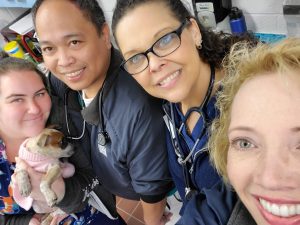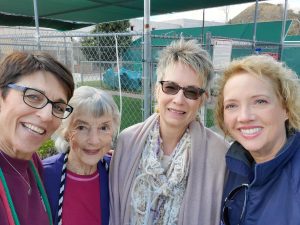Assembly Bill 1553 became effective on January 1, 2020. This bill changed the language in several sections of code in California law.
The word “pound” (as in dog pound) was replaced with “animal shelter.” The person in charge of the “pound” was the “poundkeeper.” Now they are the “shelter director.” A “pound officer” is now an “animal control officer.” Thankfully, the terms “destroyed” and “killed” have been changed to “humanely euthanized.”
Our terrific medical team: volunteer RVT Jessica Sanderson, Dr. Joselito San Juan, and RVT Julia Baden
These changes reflect the tremendous progress made in the field of animal welfare. The archaic terms of “pound,” “destroyed,” and “killed” are not accurate words to describe the work that goes on in today’s animal shelters. The use of the word “pound” caused me to reflect on how our important role in the community has changed and I recalled an experience I will never forget.
I began my career in animal welfare in my junior year studying animal science at Western Illinois University. I was hired as a part-time animal control officer for McDonough County’s small, rural animal control facility. Based on today’s standards, I would call it a pound. Nevertheless, despite the spartan building and resources I was thrilled to have discovered a career that seemed made for me – helping animals and the people who cared about them. I loved it so much that I often got in trouble for forgetting to turn in my weekly timecard; to me, it wasn’t a job but a passion.
One day my boss told me on the upcoming Saturday, when I would be alone at the facility, a man would come by to pick out some dogs. I was to give him whatever dogs he wished. On Saturday this man drove down the long gravel road to our remote facility and backed his pickup truck up to the entrance. It was an old, rusted, blue standard sized pickup that had seen better days. A white shell was attached on the bed of the truck. He raised the shell door and lowered the tailgate. I was speechless at what I saw inside.
The bed of the truck was divided horizontally into upper and lower levels by a platform of particle board. I saw dozens of eyes staring back at me behind wire mesh. Beautiful dogs were wiggling their bodies at the sight of humans, and probably the chance for fresh air. Their soulful eyes pleaded for love and help. I saw immediately how the dogs in the lower level had no opportunity for fresh air or sunlight when the truck was closed, and the top-level dogs only had minimal ventilation.
I stood there in shock. I had no idea what this man’s purpose was, and only realized much later into my career that I was witnessing a “buncher.” Bunchers were people who bought dogs from pounds and shelters to sell for medical experimentation and research. The practice was called “pound seizure.” Poorly regulated by the federal government, many lost family pets disappeared this way during the 1980’s and earlier decades.
My mind was racing. I still didn’t know what this man’s intentions were, but I could tell that whatever this was, it was wrong. My boss had been clear on his instructions but there was no way I was about to give this man any dogs. I resigned myself to the fact that I would be fired the next week for disobeying my boss’s orders and was sad that the job I enjoyed so much would end. But before I had to refuse the buncher’s request the man looked down the road, said he would not be taking any dogs that day, and quickly closed his truck and left.
I turned to where he had been looking and saw a woman driving slowly along, closely watching us. She was obviously on to his scheme and he didn’t want any trouble. The next week my boss told me that this woman had reported the buncher’s visit to his supervisors, and that the decision was made that the buncher would no longer be coming for dogs. I was immensely relieved and have never forgotten this woman’s courage and conviction to help the animals. She was a true angel.
I mention this because it is a clear indicator of how far our country has come in its treatment and concern for homeless animals. Thirty-five years later, pound seizure is almost unheard of and against the law in most states. These days, our department has even moved beyond the term “animal shelter” to use the more descriptive “animal care center.”
Animal Care Center (ACC) is a better term to use to describe the wholistic and comprehensive services we provide. These include an industry-leading medical program for prevention, diagnosis, and treatments of illnesses and injuries; an animal behavior and enrichment division to ensure the mental and behavior well-being of the animals; partnerships with other organizations to increase adoption opportunities; transfer programs to relocate animals from our overpopulated ACCs to areas of the country with a shortage of homeless pets; a vibrant and engaged volunteer program, and much more. “Shelter” does not go far enough to describe what we do.
Volunteers and HHA members Tamy Rieder, Donna Hartnett, and Robin Kahrs
I saw some great examples of these operational practices when I spent a day at our Agoura Animal Care Center on January 21. I was thrilled to witness the adoption of Smokey, a beautiful German Shepherd who our staff and volunteers had been working tirelessly to find a new home for 136 days. Smokey had arrived at the ACC with the need for emergency abdominal surgery. The nonprofit organization that supports our Agoura ACC’s lifesaving efforts, Healthcare for Homeless Animals, paid for the surgery to save Smokey. Everyone was overjoyed that Smokey found his new forever home.
A little female Australian Heeler puppy was surrendered by her owners. She was trembling and frightened. The compassionate medical staff and volunteers gently examined her and gave her lots of love. I vaccinated and dewormed her, and a volunteer found her an adorable pink princess sweater to wear. Our volunteers in the kennels couldn’t bear to put her in a dog run alone, so they held her and consoled her as she learned to acclimate to her new environment. Within an hour, a person expressed interest in adopting the puppy. Because state law requires we spay or neuter all dogs and cats prior to adoption, she couldn’t immediately go home with her new owner. A volunteer offered to bring her home to foster care for her until her surgery was performed. Everyone pulled together for both Smokey and this little puppy.
Words matter. Do the stories of Smokey and the little puppy make you think of “pound” or “animal care center”? I am so proud and grateful for the amazing work performed every day by our staff, volunteers, and engaged community partners. It is fitting that state law has changed its language to better describe the important work done by animal welfare agencies in California.
Please help spread the word(s)!


